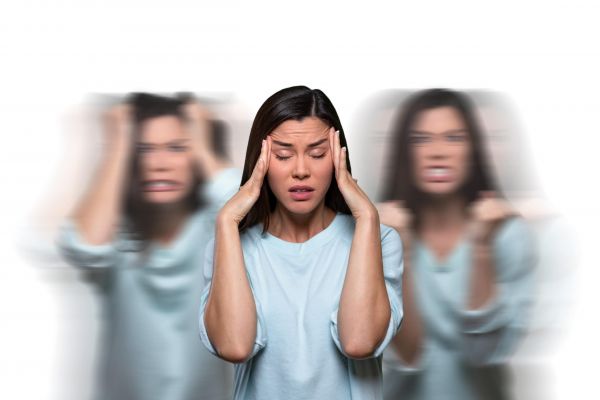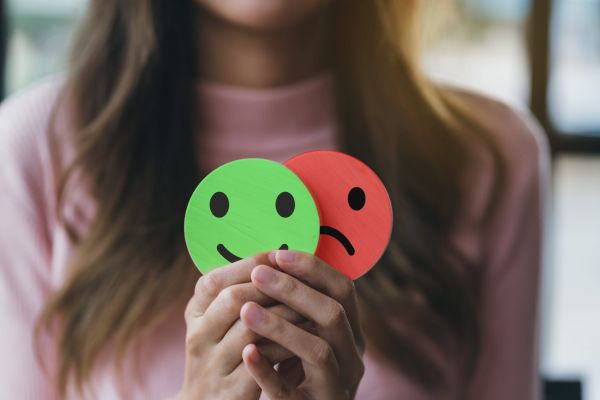Co-Occurring Disorders Treatment in Kansas City

Empowered Recovery Kansas City offers comprehensive treatment and support for individuals struggling with mental health disorders and addiction at our Kansas City rehab center. With a team of experienced professionals dedicated to compassionate, individualized care, we provide mental health and addiction treatment services that support the physical and emotional well-being essential for long-term recovery. We strive to empower our clients through evidence-based treatments that foster positive personal growth, from medication management to various therapy modalities that promote healthy coping skills and self-care practices.
Whether someone is struggling with depression or anxiety alongside addiction or needs ongoing support while managing a chronic condition such as bipolar disorder or schizophrenia, the knowledgeable staff at Empowered Recovery Kansas City will work closely with them on developing a personalized plan of action that best suits their unique situation.
What Are Co-Occurring Disorders?
Co-occurring disorders, also known as dual diagnosis, refer to the presence of both a mental health disorder and a substance use disorder (SUD) at the same time. These conditions are deeply interconnected—mental health symptoms can drive a person to use drugs or alcohol as a form of relief, while substance use can worsen or even trigger mental health symptoms. Common co-occurring disorders include depression, anxiety, and post-traumatic stress disorder (PTSD).
Living with co-occurring disorders can be especially challenging because each condition influences the other. For example, untreated anxiety may fuel substance use, while ongoing drug or alcohol use may intensify anxiety symptoms. This creates a cycle that can be difficult to break without professional support. The overlap of symptoms can also make diagnosis and treatment more complex, requiring a comprehensive approach that addresses both conditions together.
Dual diagnosis treatment recognizes this relationship and provides integrated care designed to treat the whole person—not just one condition in isolation. By addressing both the mental health disorder and the substance use disorder simultaneously, individuals have a stronger chance of achieving stability, reducing relapse risk, and building a lasting foundation for recovery.
The Importance of Mental Health
Mental health is an important but often overlooked aspect of overall well-being. It impacts how we think, feel and act, and can affect our ability to cope with stress, build relationships, and make positive decisions. Unfortunately, mental health issues are often stigmatized or not taken seriously, leading to people suffering in silence or not seeking help when they need it.
However, mental health should be treated with the same importance as physical health, especially when treated alongside addiction. Just like we would see a doctor for a physical ailment, there are mental health professionals who offer therapy treatments that improve our emotional well-being. Moreover, it’s important to remember that mental health disorders are treatable and there’s no shame in seeking help from a qualified professional.
No matter what kind of mental health struggle someone might be dealing with — whether it’s mild depression or something more significant — there is help available. Our Kansas City mental health and addiction professionals offer guidance and support through tough times and provide the tools necessary for lasting change and long-term recovery.
Co-Occurring Disorders We Treat
Mental health disorders are a broad group of conditions that can significantly impact an individual’s mental state, emotions, and behavior. Symptoms vary greatly depending on the type of disorder and can range from mild to severe. Consequently, some people may experience difficulty carrying out daily activities while others may be completely debilitated by their symptoms. For long-term recovery from drugs or alcohol, it is vital for patients to receive treatment for any mental health disorders they may have.

Depression
Depression is one of the most common types of mental health disorders, characterized by feelings of sadness or emptiness. Generally, individuals with depression will have a low mood lasting longer than two weeks and other symptoms such as changes in appetite or sleep patterns, fatigue, difficulty concentrating or making decisions, feelings of worthlessness or guilt, thoughts of death or suicide, withdrawal from social activities and hobbies previously enjoyed.

Anxiety
Anxiety is another commonly diagnosed mental health disorder that can cause intense fear or worry and physical symptoms such as increased heart rate or sweating. It can manifest itself in various forms such as generalized anxiety disorder (GAD), panic disorder, social anxiety disorder (SAD), and phobias. Those suffering from anxiety often experience anticipatory fear about future events as well as intrusive thoughts about past experiences.

Bipolar Disorder
Bipolar disorder is a type of mood disorder that involves significant shifts in mood ranging from extreme elation known as mania to deep depression. Symptoms usually occur in cycles over a period of days to months. These include changes in energy level or activity level (i.e., sleeping too much/too little), speaking very quickly with racing thoughts/ideas, and feeling irritable or overly excited/elated without reason.

Schizophrenia
Schizophrenia is a severe mental illness that affects how an individual thinks, feels, and behaves. People with this condition may hear voices that aren’t real (auditory hallucinations) or have delusional beliefs such as believing they are famous when they are not (delusions). Other symptoms include disorganized speech or behavior (such as talking incoherently) lack of emotional expression and difficulty focusing on tasks/activities due to poor concentration levels.

Post-Traumatic Stress Disorder (PTSD)
Post-traumatic stress disorder (PTSD) develops after someone has experienced a traumatic event such as war combat exposure or experiencing physical violence. Symptoms typically involve:
- Flashbacks to the event cause distress
- Avoidance behaviors related to reminders of the event
- Negative changes in thinking patterns
- Distorted self-image
- Hyperarousal
- Difficulty sleeping/concentrating
- Increased startle response
- Easily angered/irritated
- Individuals with PTSD often also suffer from depression comorbidly

Obsessive-Compulsive Disorder (OCD)
Obsessive-Compulsive Disorder(OCD) is characterized by intrusive thoughts followed by repetitive behaviors aimed at reducing the distress caused by these obsessions. This causes significant interference in day-to-day life functioning. Common obsessions tend to involve contamination fears, symmetry needs, religious concerns, and fear of harming oneself/others. Compulsions are behavioral rituals such as excessive cleaning/washing hands; checking locks multiple times; arranging items symmetrically etc.

Personality Disorders
Personality disorders are a group of mental health conditions that can cause an individual to have difficulty managing their emotions and behavior. Thus, leading to problems with personal and professional relationships. Symptoms may include:
- Difficulty with communication
- Impulsivity
- Low self-esteem
- Extreme mood swings
- Social isolation
- Difficulty forming and maintaining relationships
Personality disorders are generally divided into three clusters based on their primary symptom patterns including Cluster A (odd or eccentric), Cluster B (dramatic, emotional, or erratic), and Cluster C (anxious or fearful).
Outpatient Mental Health & Addiction Treatment Services
Mental health and substance use disorders can be debilitating in an individual’s life, but with the right treatment, they can be effectively managed. Our Kansas City outpatient services offer numerous benefits for those who require mental health and addiction treatment but desire the flexibility to maintain other commitments.
Outpatient mental health services prioritize maintaining an individual’s independence and autonomy. Additionally, it allows them to continue with daily activities and responsibilities such as work, school, or family commitments without having to disrupt their lives. Also, outpatient services are usually more affordable than inpatient services and may even be covered by insurance.
We offer several levels of outpatient care to meet each person’s unique needs. Our Partial Hospitalization Program (PHP) provides the most structured option, with full-day treatment sessions designed for those needing intensive support without overnight care. The Intensive Outpatient Program (IOP) offers a step down in intensity, balancing several hours of therapy and support each week with the flexibility to manage work, school, or family responsibilities. For those requiring a lower level of care, our standard outpatient program includes scheduled therapy and check-ins that help clients maintain progress, reinforce coping strategies, and continue recovery while living independently.
Medication Management for Mental Health Disorders
Psychiatric medications play an important role in helping to regulate mood and thought patterns by targeting the brain chemicals that are associated with emotional states. These medications are often most effective when used in combination with other forms of therapy like CBT, DBT, and more. For instance, a person who is suffering from depression and addiction may find it difficult to engage in therapy due to a lack of energy or concentration. Medication can be used to help ease these symptoms so that they can more effectively participate in the therapeutic process.
Unfortunately, it is not always easy to determine which medication will work best for a particular individual. Therefore, different people can have varying responses to each type of medication. Doctors usually consider family history and potential side effects when making a recommendation, as well as looking at clinical evidence that may suggest one medicine over another. It is important to remember that finding the right medication regimen can take time.
Some medications may start working quickly, while others may take weeks before any changes are observed. If side effects become troublesome or if it appears that the drug is not working properly. Then, it might be necessary to adjust dosage levels or switch medications altogether.
The use of psychiatric medications does not necessarily have to be permanent. For some individuals, needing only short-term aid for a few months might be sufficient. In more severe cases, however, such medications might need to be taken on a long-term basis or even for life. Psychiatric medications allow people to take control and live their lives without having their personalities altered negatively by the drugs they take.
Therapy for Co-Occurring Disorders
While medication can help manage the symptoms of mental health disorders, therapy plays an equally important role in recovery by addressing the underlying thoughts, emotions, and behaviors that contribute to substance use. Evidence-based therapies such as Cognitive Behavioral Therapy (CBT), Dialectical Behavior Therapy (DBT), and trauma-focused therapies are often used to help clients identify harmful thought patterns, develop healthier coping strategies, and manage triggers that could otherwise lead to relapse. By creating a safe and structured space, therapy allows individuals to process difficult emotions and experiences that may have fueled their substance use.
In addition to building coping skills, therapy helps strengthen motivation for recovery and provides ongoing support as individuals navigate the challenges of daily life. For example, someone with anxiety and addiction may learn grounding techniques to manage panic symptoms without turning to substances, while a person with depression and addiction may work on setting realistic goals and building social connections. Group therapy can also provide the benefit of shared experiences and peer support, while family therapy works to repair relationships and improve communication at home.
The importance of therapy lies in its ability to treat the whole person—not just the addiction or the mental health condition in isolation. By addressing both together, therapy empowers individuals to better understand themselves, build resilience, and create a foundation for lasting recovery.
Kansas City Mental Health & Addiction Treatment
Empowered Recovery Kansas City is a premier mental health and substance use disorder rehab center providing comprehensive care for individuals, couples, and families. Our team of experienced clinicians is dedicated to helping you achieve your goals and live a life full of joy, balance, and long-term recovery from drugs and alcohol. We provide individualized mental health and addiction treatment plans tailored to meet the unique needs of each client so they can reach their optimal level of wellness. Whether you’re struggling with depression, anxiety, or trauma-related issues – our compassionate team will help you find relief and make lasting changes that improve your quality of life.
Contact us today to learn more about our Kansas City drug and alcohol rehab.
